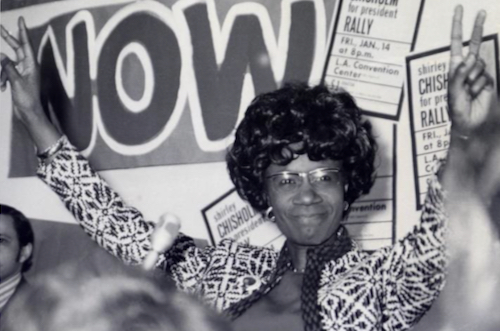This article, from the February 2019 edition of the Charmeck Chronicle, is published here with permission of the author.
By DonnaMarie Woodson
Forty-six years ago on January 21st, U.S. Representative Shirley Chisholm made history when she announced her intention to run for President of the United States. In her historic speech. Representative Chisholm declared that she was not the Black candidate, the candidate of the women’s movement, or the candidate of any political bosses, fat cats, or special interests, but rather, a candidate of the People.
Born Shirley Anita St. Hill on September 30th, 1924, Shirley Chisholm was the first daughter of Guyanese and Bajan immigrants, who had settled in Brooklyn, New York.
After graduating from Brooklyn College in 1946, Chisholm began her exemplary career as a teacher, earning a Master’s of Arts Degree in Elementary Education from Columbia University.
Chisholm began her career in politics when she became a New York State Assembly member from 1965-1968. In 1968, Chisholm arrived in Washington, D.C when she became the first Black woman to be elected to the U.S. House of Representatives, representing New York’s 12th Congressional District.
In 1971 Chisholm co-founded the National Women’s Political Caucus (NWPC) to increase the number of women in all aspects of public life as elected and appointed officials, judges in state and federal courts, and delegates to national political conventions. At the time of the NWPC’s conception, women numbered just 363, or 4.7 percent of state legislators. Today, women number 1,738 state legislators, or 23.5 percent, as more women seek positions in public service.
Congresswoman Chisholm served seven terms in Congress, introduced more than fifty pieces of legislation, and maintained her reputation as a hard-working progressive, who strongly championed equality for women, people of color and the poor.

When Shirley Chisholm launched her presidential bid in 1972, she was the very first Black woman to do so and faced gender and racial discrimination as a candidate. Gender discrimination was the greatest challenge, in Chisholm’s opinion. She often said: “Between being black and being a woman, the biggest problem was being a woman.”
Fast forward to to January 21, 2019, the same day as Shirley Chisholm declared her candidacy, the Junior Senator from California, Kamala Harris, made her announcement, throwing her “heels” into the ring as a candidate for President of the United States in 2020. Harris is the first African-American woman and the fourth woman currently serving in Congress to announce a run for the White House in 2020.
In Senator Harris’ own words: “Justice. Decency. Equality. Freedom. Democracy. These aren’t just words. They’re the values we as Americans cherish. And they’re all on the line now,” Harris said in the video teaser before her official kickoff in her birthplace of Oakland, CA on Sunday, January 27, 2019.
“The future of our country depends on you and millions of others lifting our voices to fight for our American values,” the Democratic California senator said. “That’s why I’m running for president of the United States. “I’m running to lift those voices, to bring our voices together.”
Harris chose to announce her campaign run on January 21 to honor the legacies of two of her heroes: Shirley Chisholm and Martin Luther King Jr., who has been a role model for Harris throughout her life in what she views as his “aspirational fight for progress.”
In February 2005, “Shirley Chisholm ’72: Unbought and Unbossed,” a documentary film, aired on U.S public television. It chronicled Chisholm’s 1972 bid for the Democratic presidential nomination. It was directed and produced by independent African-American filmmaker Shola Lynch. The film was featured at the Sundance Film Festival in 2004. On April 9, 2006, the film was announced as a winner of a Peabody Award.
Chisholm’s legacy came into renewed prominence during the 2008 Democratic presidential primaries, when Barack Obama and Hillary Clinton staged their historic “firsts” battle – where the victor would either be the first major party African-American nominee, or the first woman nominee – with at least one observer crediting Chisholm’s 1972 campaign as having paved the way for both of them.
The 2018 Midterms were historic not only for the largest majority since 1974, but also for the diversity and number of women candidates. I wonder, will this energy and momentum carry
through the 2020 elections?
And, will Shirley Chisholm’s dream be realized with the election of the First African-American woman President of the United States?
Works Cited:
Yvette Clarke on Chisholm
Wikipedia on Shirley Chisholm
Wikipedia on Kamala Harris
CNN
New York Times